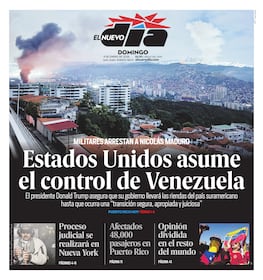Governor-elect Jenniffer González’s initiative to convene a multidisciplinary, cross-cutting and specialized committee to find a solution to the serious energy crisis facing the people of Puerto Rico is the right decision.
---
Lee este artículo en español.
---
A problem of this magnitude requires solutions that are up to the task. The governor-elect’s invitation is a remarkable gesture that goes beyond the urgent search for technical answers. This cross-cutting approach transcends party lines and establishes, from the beginning of her term, a way of doing politics that is consistent with Puerto Rican idiosyncrasy: collaborative, dialogic and cordial.
The governor-elect’s call has been answered by 12 men and women who will have to diagnose a way out of the perfect storm that is battering our fragile electric power distribution and production system. The group represents a balanced mix of experts in the field, public finance and management experience, along with representatives from industry, tourism and academia.
In this way, before assuming his mandate, González responds to the clamor of a citizenry genuinely concerned about the current and future supply that, far from being a source of tranquility and economic development, represents a burden exacerbated by the rise in the electricity bill, which stifles the family budget and makes the production of goods and services more expensive.
At the same time, González’s management reflects the intention to put in place accountability and compliance controls as part of good management practices that seem to be relegated among the entities and officials responsible for the energy transformation. It is a good sign that rigorousness will be sought to achieve objectives, according to defined stages or terms, as well as consequences in case of non-compliance.
The future tenant of La Fortaleza decided to separate the waters on the two fronts that have the solution to this crisis in check.
On the one hand, this committee of experts will have the mission of reaching consensus on solutions and proposing courses of action that involve complex decisions. Whether or not to terminate the operators’ contracts is not a step that has been formally proposed. However, if considered, it would require the approval of the Fiscal Oversight Board.
The companies in charge of stabilizing the system have committed gross inefficiencies. In the case of LUMA, there has been an excessive definition of processes and little operational action. For example, the 24/7 emergency shifts were shortened to two per week without considering Sunday. LUMA’s contract is temporary, not final, which poses a risk that synergies will not emerge once the new government administration begins in earnest. Genera, for its part, has not been able to stabilize energy production, which remains as fragile as before the beginning of this public-private partnership.
On the other hand, the judicial process of the bankruptcy of the Puerto Rico Electric Power Authority (PREPA) is another issue that makes the scenario more complex. The impasse between the Fiscal Oversight Board (FOSB) and Prepa’s bondholders is preventing an agreement from being reached. This impasse, as stated in a devastating and recent report by the Mediation Team to U.S. District Judge Laura Taylor Swain, compromises the financial and operational viability of the electric system.
With the judicial course on track, it is desirable to isolate another factor that often contaminates technical discussions. Hopefully, this working committee will be able to achieve the weight to make a good diagnosis, far from the political din or campaign promises that can precipitate catastrophic solutions.
We are accustomed to seeing our woes as unique and local. However, the global political landscape offers great challenges in times when energy is scarce to such an extent that we have seen setbacks on such controversial issues as the current construction of fossil fuel-fired plants in other latitudes. And what can we say about Donald Trump’s manifest attempt to regain American leadership in world geopolitics? If Puerto Rico intends to compete as a territory suitable to welcome the return of manufacturing, after the tariff barriers on products of Chinese origin, it must have a solvent energy system.
The problems are diverse and complex, but the solutions are imperative if we are not to miss the development train and the opportunities of this millennium.
---
This content was translated from Spanish to English using artificial intelligence and was reviewed by an editor before being published.


